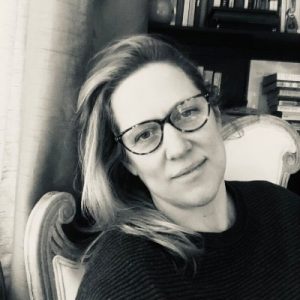From Translating Dostoyevski to Writing Fiction
 Natasha Randall’s debut novel Love Orange is out now from riverrun (Hachette). She has translated many novels from the Russian including Dostoyevsky’s Notes from Underground, Zamyatin’s We, and Lermontov’s A Hero of Our Time. Her words have appeared in The Yale Review, the TLS, the LATimes Book Review, The Moscow Times and in Strad magazine. We asked her how translating compares with writing fiction.
Natasha Randall’s debut novel Love Orange is out now from riverrun (Hachette). She has translated many novels from the Russian including Dostoyevsky’s Notes from Underground, Zamyatin’s We, and Lermontov’s A Hero of Our Time. Her words have appeared in The Yale Review, the TLS, the LATimes Book Review, The Moscow Times and in Strad magazine. We asked her how translating compares with writing fiction.
There is music playing somewhere in the village and I can’t write. I don’t mind the goats bleating, or the chickens having squabbles. The cats and the dogs shout at each other a little. None of that bothers me— mostly, it amuses me. I often wonder what they are saying to each other. The animals are so expressive! But someone is playing French ballads today and it is interfering with my inner ear.
To me, all writing is incantation. I feel music in words, the groupings of language. As a literary translator, it has been essential to my practice: I listen for the rhythms of an author’s words, for their most beloved consonants. As a novelist, sounds are crucial too, but I am less conscious of them because I am the one singing.
I have translated several books from Russian and each time, it has taken about three months for me to start really hearing the cadences of the literature. I have to re-read, and sometimes read it aloud, and then the patterns emerge. I am not looking for regular patterns necessarily, but there is something, some algorithm, that hides amidst the grammar. Punctuation is very important. Paragraphs break and wash long like waves, across pages. Changes in tone provide colouration.
Every translation has its oddity— a word favoured by the author, a recurring theme to burnish as you bring it into a new linguistic world. There is always some trick of the original author’s prose that you must consider carefully.
In Notes from Underground, Dostoyevsky uses the word ‘zloi’ dozens of times— and it has at least four rough equivalents in English: ‘mean, nasty, spiteful, evil’. A crucial word— and what a beautiful sounding unit: ZLOI! None of the corresponding English words have a similar music and so I chose spiteful, because it seemed the most appropriately nuanced in meaning, and I like the split digraph of ‘ite’. Evil has an interesting sound to it also, but it was too monochromatic for the text. (There are always so many convolutions in any one translating decision.)
Before that, there was Yevgeny Zamyatin. He wrote a futuristic book in 1922 called We and it is very similar to A Brave New World and 1984 but predates them both by many years. I loved translating this book, not least because Zamyatin was a sound fiend too.
He told the artist Yuri Annenkov that he had a certain synesthesia— he ascribed qualities to certain letters. These are some of his equivalents:
D and T = stifling, grave, foggy, obscuring, stagnant
Can you imagine the task of the translator in the face of a language so specific in its sounds? I jumped at the challenge. For example, there is glass and metal everywhere in We, and therefore, a word that is so central to the book is sverkayushchii. I could have rendered it as ‘glittering’ — many grand structures shimmer, glitter and gleam in the world of Zamyatin’s One State. All of these words would have been adequate choices. But I chose ‘sparkling’ and I chose it out of deference for Zamyatin’s letter associations, particularly the consonants.
Eventually, the task of translation blurred for me, and I started writing my own fictions. I say ‘blurred’ because, to me, all writing is translation — whether from one language to another, or from an inner discourse to an external text. We all translate all the time. We don’t call it translation though. How do the amorphous thoughts of our mind turn into the words we speak? How do the words we conjure then convert to the shapes of letters upon the written page? These are translations, too.
I wrote my novel Love Orange like a simultaneous interpreter, as though I was listening to it and transcribing it. That makes it sound mystical, it wasn’t mystical. There were no voices from the ether. I was merely following a narrative voice, one that I found to tell the story of a nuclear family in meltdown. The voice was answering one long and continuous question: what happens to these people?
I might have been whispering this to myself throughout the novel-writing process, I think. What happens to these people? What happens to these unfortunate and desperate people? I took up my characters in turns, each chapter follows a different person and they pass the baton forward. The story moves as though they’re playing ‘broken telephone’. They lie to each other, and there are misunderstandings. At one point, a priest pretends to be the voice of God in text messages to a man in prison. It occurs to me that I may have absorbed Lermontov’s tendency to multiple perspectives. I certainly drank from Gogol’s absurdities as I wrote Love Orange.
This is the crucial distinction for me between writing a translation and writing a novel. In a translation, I am asking the author “what next?” and the reply is always forthcoming — it’s in the next sentence. The novel says: onwards. The translated book says: just follow the miraculous blueprint. But, in both cases, I have to listen for the acoustics of the words.
—
Natasha Randall’s debut novel Love Orange is forthcoming on 3 September from riverrun (Hachette). She has translated many novels from the Russian including Dostoyevsky’s Notes from Underground, Zamyatin’s We, and Lermontov’s A Hero of Our Time. Her words have appeared in The Yale Review, the TLS, the LATimes Book Review, The Moscow Times and in Strad magazine.
Follow her on Twitter @NatashaRandall
Find out more about her on her website http://www.natasharandall.com/
LOVE ORANGE
 An extraordinary debut novel by Natasha Randall, exposing the seam of secrets within an American family, from beneath the plastic surfaces of their new ‘smart’ home. Love Orange charts the gentle absurdities of their lives, and the devastating consequences of casual choices.
An extraordinary debut novel by Natasha Randall, exposing the seam of secrets within an American family, from beneath the plastic surfaces of their new ‘smart’ home. Love Orange charts the gentle absurdities of their lives, and the devastating consequences of casual choices.
While Hank struggles with his lack of professional success, his wife Jenny, feeling stuck and beset by an urge to do good, becomes ensnared in a dangerous correspondence with a prison inmate called John. Letter by letter, John pinches Jenny awake from the “marshmallow numbness” of her life. The children, meanwhile, unwittingly disturb the foundations of their home life with forays into the dark net and strange geological experiments.
Jenny’s bid for freedom takes a sour turn when she becomes the go-between for John and his wife, and develops an unnatural obsession for the orange glue that seals his letters…
Love Orange throws open the blinds of American life, showing a family facing up to the modern age, from the ascendancy of technology, the predicaments of masculinity, the pathologising of children, the epidemic of opioid addiction and the tyranny of the WhatsApp Gods. The first novel by the acclaimed translator is a comic cocktail, an exuberant skewering of contemporary anxieties and prejudices.
Category: On Writing






























